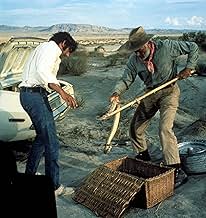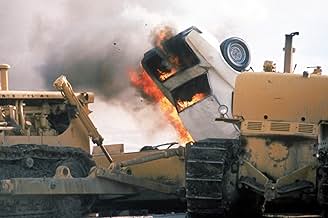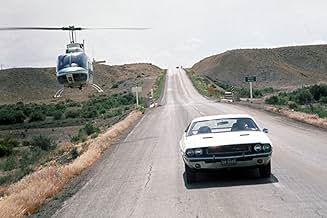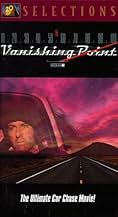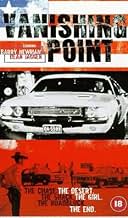PUNTUACIÓN EN IMDb
7,2/10
32 mil
TU PUNTUACIÓN
Durante los 70, el repartidor de coches Kowalksi siempre hace el reparto en tiempo récord, a pesar de los problemas que esto le da con los de tráfico.Durante los 70, el repartidor de coches Kowalksi siempre hace el reparto en tiempo récord, a pesar de los problemas que esto le da con los de tráfico.Durante los 70, el repartidor de coches Kowalksi siempre hace el reparto en tiempo récord, a pesar de los problemas que esto le da con los de tráfico.
- Dirección
- Guión
- Reparto principal
- Premios
- 1 nominación en total
Charlotte Rampling
- Hitch-Hiker
- (escenas eliminadas)
Robert Donner
- Deputy Collins
- (as Bob Donner)
Reseñas destacadas
Just received a DVD of this film and was pleasantly surprised. The image is restored and looks great. After years of watching grainy and scratched prints its nice to see it as it was in 1971. Theatrical trailer and two TV spots are included. Commentary by Richard C. Sarifian brings some insights into filming locations, the various actors, etc. (Gilda Texter was severely sunburned during her desert motorcycle ride and she was girl friend of actor Paul Koslo who also appears in film.) And a story of a prostitute befriended by the crew,who stole the last remaining challenger. (eight were used, only one survived.) She was caught sometime later. The real treat is actress
Charlotte Ramplings missing scene near the end of the film. While it really adds nothing to the story,its nice to finally see the missing footage after thirty years. There are also some striking images of the challenger at daybreak in that previously missing scene. The only thing lacking is commentary from the STAR of the film, Barry Newman,which would have made this a Great DVD.
Charlotte Ramplings missing scene near the end of the film. While it really adds nothing to the story,its nice to finally see the missing footage after thirty years. There are also some striking images of the challenger at daybreak in that previously missing scene. The only thing lacking is commentary from the STAR of the film, Barry Newman,which would have made this a Great DVD.
Gosh, I had forgotten how powerful this is.
Seeing it again is a real lesson on how certain cinematic language, if presented purely, transcends. And for a US-made movie, it is pretty pure.
If you do not know it, the primary narrative is essentially no narrative: a muscle car speeding across the desert chased by police, initially for speeding and ultimately just to exert power. This fellow is Kowalski, a name imported from a landmark film. He simply drives. It is his life now. We see flashbacks. Find he was a Medal of Honor winner in Vietnam, a star racer and then a cop. There's a backstory about his being a good cop and turning in some rotten apples, so by degrees we come to understand the moral landscape.
There is only one other character, a blind black disk jockey who is listened to by apparently everyone. Guided by his eavesdropping on police radio, and some psychic ability.
This was after "Easy Rider" and instead of bold men moving into a life, we have life chasing an honest man. Same ethic, could even have been the same man. But he knows himself. He knows he is a cinematic creature, someone to be observed and dreamed about. He knows he carries his world with him. Always borrowed.
You can see Malick here, the notion that the character sees us seeing him, that he knows he is fictional and knows we think him not. You can trace it to the female version in "Thelma and Louise," where they have their end only because they know someone will watch. Its not like "Cool Hand Luke," or "Bonnie and Clyde" at all where the man decides. That comes from the Hollywood western.
Its derived from the "Breathless" tradition.
A good third of this film is spent on the "audience," the rural townspeople. These parts are filmed in a documentary style, with — it seems — real people who have come to watch the filming, having heard on the radio from a borrowed soul. They look dumb and bored, clearly with nothing better to do than watch, just like us.
Ted's Evaluation -- 3 of 3: Worth watching.
Seeing it again is a real lesson on how certain cinematic language, if presented purely, transcends. And for a US-made movie, it is pretty pure.
If you do not know it, the primary narrative is essentially no narrative: a muscle car speeding across the desert chased by police, initially for speeding and ultimately just to exert power. This fellow is Kowalski, a name imported from a landmark film. He simply drives. It is his life now. We see flashbacks. Find he was a Medal of Honor winner in Vietnam, a star racer and then a cop. There's a backstory about his being a good cop and turning in some rotten apples, so by degrees we come to understand the moral landscape.
There is only one other character, a blind black disk jockey who is listened to by apparently everyone. Guided by his eavesdropping on police radio, and some psychic ability.
This was after "Easy Rider" and instead of bold men moving into a life, we have life chasing an honest man. Same ethic, could even have been the same man. But he knows himself. He knows he is a cinematic creature, someone to be observed and dreamed about. He knows he carries his world with him. Always borrowed.
You can see Malick here, the notion that the character sees us seeing him, that he knows he is fictional and knows we think him not. You can trace it to the female version in "Thelma and Louise," where they have their end only because they know someone will watch. Its not like "Cool Hand Luke," or "Bonnie and Clyde" at all where the man decides. That comes from the Hollywood western.
Its derived from the "Breathless" tradition.
A good third of this film is spent on the "audience," the rural townspeople. These parts are filmed in a documentary style, with — it seems — real people who have come to watch the filming, having heard on the radio from a borrowed soul. They look dumb and bored, clearly with nothing better to do than watch, just like us.
Ted's Evaluation -- 3 of 3: Worth watching.
One thing I realised about carfilms, or whatever you might call them, is that a certain degree of monotony is always required (check out the wonderful Two Lane Blacktop too see what I mean). If you waste too much time with backgrounds, character development, story etc the really important stuff starts lacking (the car as an instrument of freedom, the road, the desert...). In this way Vanishing Point is the perfect carmovie: it's about the most monotonous, yet beautiful things i've ever seen! It's about:
1. The car
2. The road
3. The desert
4. The music
And nothing else! Some vague attempts are made to make a character out of Kowalski, but fortunely they're small in numbers. The car is the true main character of the film.
I recommend this film with all my heart.
1. The car
2. The road
3. The desert
4. The music
And nothing else! Some vague attempts are made to make a character out of Kowalski, but fortunely they're small in numbers. The car is the true main character of the film.
I recommend this film with all my heart.
"Vanishing Point" asks the question and, like other films of this kind before "Smokey & the Bandit" brought the genre to an end, lets us ponder the answer on our own. Other than that, there's no point to this film except to demonstrate that the Challenger is one of the best-looking muscle/sports cars ever made. Get too far into this movie & you'll want to sell your children to have one. Kowalski is a '70s knight-errant, or a Greek mythological hero, just as you please. He rides his Hemi-powered steed on a quest to San Francisco, not for a "what," or a "why," or even for a lady fair, but only for "how fast." Does he seek redemption? Escape? Self-forgiveness? To stick it to the Man? Who cares? Knavish cops close in on him, lotus-eaters like Hovah (Darden) shun him, sirens (especially the stark-naked Texter, who would've stopped Burt Reynolds's Bandit faster than Sally Field ever did) want him to dally. Sharp-featured, Western character actor Anthony James has a hilarious, uncharacteristic turn as a gay hitchhiker. Humble, noble souls come forth to guide Kowalski like angels, including a scruffy snake-hunter (Jagger), chopper jockey & drug dealer Angel (Scott), and the blind deejay Super Soul (Little, who should've been a contender for the part of Howard Beal in "Network"). The Man's attempts to explain Kowalski are annoying distractions, so hit the "mute" button when you see scenes of cops in offices. And stop wondering why Kowalski, on his quest for speed, is always being overtaken & passed by other vehicles. Just put your brain in neutral, put your popcorn where it's handy, and buckle up.
Many people don't know where the radio d.j. was broadcasting from in the movie. He was broadcasting from the then closed Goldfield Hotel, in beautiful "downtown" Goldfield Nevada! I should know! I was a resident in this picturesque little town of 110 people (in 1971). The Goldfield Hotel has since found new life as a restored historical landmark. The town itself has surged in population due to new mining processes, and the re-opening of the long closed mines. During the movie, a scene picturing the front of the "Green Frog Market", you will see the faint glow of a freckle-faced, red headed little boy, gazing out of the window......yeah..it's me!! This movie was quite exciting in a town of 110 people!
¿Sabías que...?
- CuriosidadesIn an interview, actor Paul Koslo spoke about legendary stunt driver Cary Loftin; "One night coming home from location, Cary was driving one of the Challengers back to the hotel, and he passed some New Mexico state troopers going 145 miles an hour! [laughs] He had four or five cop cars behind him with their lights on, but they couldn't catch up because they could only go about 125! So he drove into this little town and started to shut the car down. He pulled into a gas station, and I swear to God, he did a 360 in between the pumps and put the rear of the car - the gas tank - right in front of the super pump! He got out of the car like nothing happened, and the troopers busted his ass right there! [laughs] Oh, you should've seen those cops! They were fuming! They took him in, and the producer had to explain to them that Cary had actually been testing the car - that he did a lot of these spinouts because he'd been having trouble with the car! [laughs] I mean, you do have to test the cars, but you don't do it while you're driving home!"
- PifiasThe 19-inch racks in Super Soul's radio station with large tape reels (in one scene seen fast moving) are not audio equipment. These tape drives were used in computer systems in the 1970s to store data on tape.
- Citas
Super Soul: This radio station was named Kowalski, in honour of the last American hero to whom speed means freedom of the soul. The question is not when's he gonna stop, but who is gonna stop him.
- Créditos adicionalesThe Fox logo is shown without the fanfare making it one of the first times this has happened.
- Versiones alternativasWhen first released in Brazil, the movie had some scenes cut, reducing the running time to 99 minutes.
- Banda sonoraYou Got to Believe
Composed by Delaney Bramlett
Sung by Delaney & Bonnie & Friends
(Courtesy of Atlantic Records)
Selecciones populares
Inicia sesión para calificar y añadir a tu lista para recibir recomendaciones personalizadas
Detalles
- Fecha de lanzamiento
- País de origen
- Idioma
- Títulos en diferentes países
- Carrera contra el destino
- Localizaciones del rodaje
- Goldfield Hotel, Goldfield, Nevada, Estados Unidos(KOW radio station)
- Empresa productora
- Ver más compañías en los créditos en IMDbPro
Taquilla
- Presupuesto
- 1.585.000 US$ (estimación)
- Recaudación en Estados Unidos y Canadá
- 12.442.673 US$
- Recaudación en todo el mundo
- 12.443.192 US$
- Duración1 hora 39 minutos
- Color
- Relación de aspecto
- 1.85 : 1
Contribuir a esta página
Sugerir un cambio o añadir el contenido que falta

Principal laguna de datos
What was the official certification given to Punto límite: cero (1971) in Mexico?
Responde

